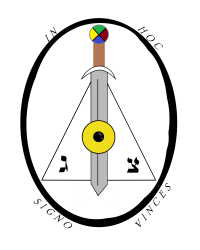Home / What is Thelemic Spiritism? / On Religion / Joy / Health & Safety / Methodology / Community / 'Spooky' Behaviours / Advancement / Book Recommendations
This is not and does not purport to represent a local body. This section of the Newcomer infosheet has been added in full (other than §III.iv), as it contains a great deal of pertinent information:
"Religion and Spirituality can be distinguished by the structured nature of the former. This can also be thought of as the Subjective (ie one’s own experience), and the Intersubjective (ie a common understanding forming a shared sense of reality). ‘Intersubjective’ may be seen to take the place of ‘Objective’, in the sense that the latter implies a single empirical reality to which we have direct access; as Husserl notes, even impartial observation is made from an anthropocentric viewpoint. This is best exemplified by the use of names - as rose is just as red by any other, and whether our experiences of redness align the word ‘red’ refers to a communally understood concept. Or: I could tell you about a poet, and you me a mountaineer, and, name unmentioned, we could theoretically never realise we are talking about facets of the same man (Crowley).
"Via shared names, the intimate interpretive experience has with these symbol sets can be more easily communicated. And, it must be remembered, we are social creatures - common ground furnishes connection."
Belonging
"The purpose of membership should be inclusionary, not exclusionary. While the well-being of members is dealt with first (as our friends naturally take precedence), goodwill is extended to the community at large. We are not monks, nor do we shy away from engaging with the world on mundane (non-spiritual) grounds.
"Any sized gathering proceeds from a common Spiritual understanding, in which one may be authentic without fear of judgement. It is comparable to a study group, where learning is made easier by enjoying each other’s company. Along with this, we may have a more positive impact on our environs by working with each other to organise larger-scale charitable programmes."
Symbol Sets
"As with membership, the use of a common symbol set is meant to be inclusionary. The symbols are common, it must be emphasised, not the interpretation. They act as a window to the ineffable, therefore if treated as a newspaper they lose all value (in other words, the map is not the territory, Ceci n'est pas une pipe).
"The symbol sets used are Qabalah and Tarot, corresponded to each other (more-or-less), as they are in the Thelemic tradition. Crowley gives two excellent analogies:
1. Qabalah as a filing cabinet, ie primarily as a means of organising.
2. It is easier to use an established, signposted road than bushwhack your way directly to your destination (though you are certainly welcome)."
Holidays
"Holidays, or Holy Days, are times throughout the year held to have, or represent something of, significance. They often occasion devotional or symbolic acts, and tend to be communal in nature. In Thelemic Spiritism these are referred to as ‘Feasts of the Times’, in large part an importation of the Pagan Wheel of the Year, that being Solstices, Equinoxes, and ‘Cross Quarters’, ie the midpoints which mark the start/end of seasons. These are celebrated to observe the cycle of nature and contemplate its relation to our own lifespan (eg the Birth of Spring and Death of Winter). The one holiday imported from Thelema, mostly in placement, on 1 Dec - the Anniversary of Crowley’s death. On that day, we recognise that the progression of society is communal and give thanks to the many who have come before, and all their work and dedication has brought us. It is a celebration of human achievement, and an opportunity to remember many hands were necessary to put together the world around us."
Our documents have been collected here in print form.

Made With The Approval Of The I.O.